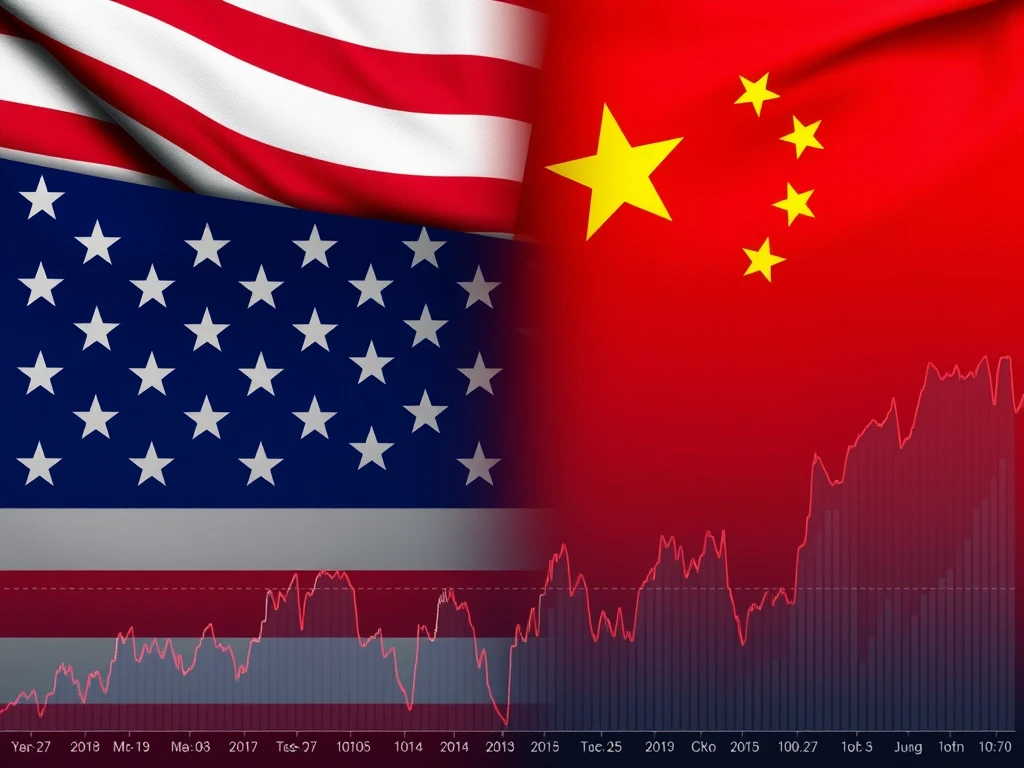US China Trade Deal Progress: Uncertainty Lingers for Financial Markets

For those tracking cryptocurrency markets, external economic factors often play a significant role in price movements. One such factor causing significant ripples is the ongoing negotiation for a US China trade deal. Recent announcements from the White House claim progress, but details are sparse, leaving investors and traders navigating a landscape of considerable doubt.
Updates on US China Trade Deal Talks
The White House recently announced that Trade talks between the United States and China have seen ‘substantial progress’. This statement, made on May 11th, suggested positive developments in the long-running trade dispute. However, a key point of contention for market participants is the absence of an official, detailed agreement.
According to the White House announcement, more specific information regarding the talks and a proposed ‘agreement’ were expected on May 12th. Treasury Secretary Scott Bessent commented, “I am happy to report that we made substantial progress between the United States and China in the very important trade talks.” He added, “We will be giving details tomorrow, but I can tell you that the talks were productive.” Notably, Bessent’s statement avoided using the word “deal.” US trade representative Jamieson Greer mentioned a “deal” but also provided no specific details.
Understanding Market Uncertainty Amidst Trade News
The lack of concrete details following the ‘substantial progress’ claim has fueled significant Market uncertainty. Investors require clarity to make informed decisions, especially in volatile environments. The ambiguity surrounding the trade talks keeps participants on edge, directly impacting sentiment across various asset classes, including traditional stocks and digital assets like cryptocurrencies.
This uncertainty stems from past experiences where the administration’s stance on trade policies has appeared inconsistent. This unpredictability makes it challenging for markets to price in potential outcomes, leading to cautious behavior and increased volatility.
The Impact of US Tariffs on Financial Markets
The trade dispute originated largely from the imposition of US tariffs by the Trump administration on various Chinese goods. These tariffs aimed to address perceived trade imbalances and unfair practices. However, their implementation caused significant disruption and volatility in global Financial markets.
While markets have partially recovered from the initial shock of the tariffs, the underlying tension and the potential for further action continue to influence investor behavior. The administration’s approach to tariffs has seen shifts, including temporary exemptions for certain tech products, which were later walked back. This back-and-forth policy making contributes to the prevailing uncertainty.
Why Trade Tensions Matter for Financial Markets
Trade tensions between major global economies like the US and China have broad implications for Financial markets worldwide. Here’s why:
- Supply Chain Disruption: Tariffs and trade barriers can disrupt established supply chains, impacting the profitability of multinational corporations.
- Economic Growth Concerns: Prolonged trade disputes can dampen global economic growth prospects, affecting investor confidence.
- Currency Fluctuations: Trade policies can influence currency valuations, adding another layer of complexity for international investors.
- Investor Sentiment: Uncertainty surrounding trade outcomes makes investors hesitant, particularly towards riskier assets.
This environment of hesitation directly affects asset classes like tech stocks and cryptocurrencies, which are often sensitive to changes in investor risk appetite. The lack of a clear, comprehensive trade policy framework adds to concerns about potential future market discord.
Summary: Progress Claimed, Doubts Remain
The White House asserts ‘substantial progress’ in the Trade talks with China regarding a potential US China trade deal. However, the absence of specific details leaves significant questions unanswered. This lack of clarity perpetuates Market uncertainty, influencing investor decisions across global Financial markets. The history of shifting US tariffs policies further contributes to the cautious sentiment. Until a concrete agreement is announced and details are revealed, markets will likely remain sensitive to every piece of news related to these crucial negotiations.









